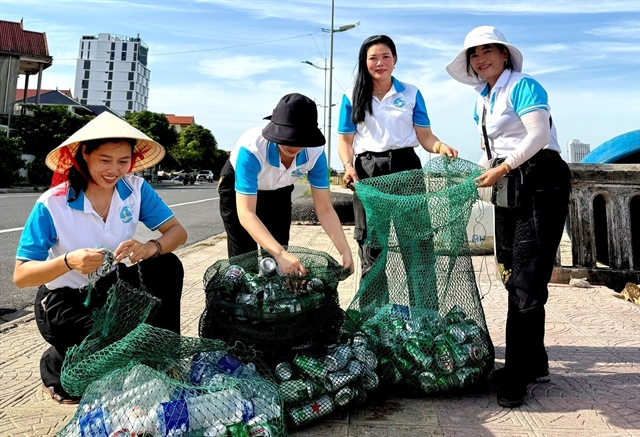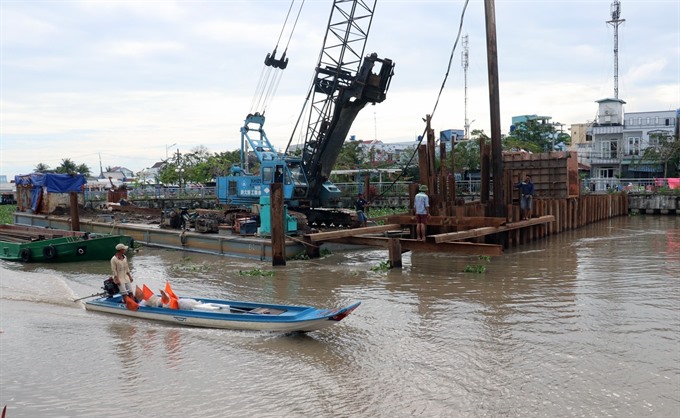 Environment
Environment

Authorities in the Mekong Delta are bracing for the dry season and the resultant saltwater intrusion from the sea in rivers.
 |
| Kiên Giang Province has built a dam on the Nhánh Canal in Rạch Giá city to prevent saltwater from entering the Long Xuyên Quadrangle and the Hậu River. – VNA/VNS Photo Lê Huy Hải |
HCM CITY – Authorities in the Mekong Delta are bracing for the dry season and the resultant saltwater intrusion from the sea in rivers.
They have taken a number of measures including dredging of canals, building temporary dams to keep out saltwater and storing water in reservoirs.
They have urged farmers to grow rice and other crops in accordance with the schedules suggested to avoid the impacts of water shortage and saltwater intrusion.
They have encouraged people living in saltwater-affected areas to store freshwater for household use.
The delta, which is home to 12 provinces and Cần Thơ City and is the country’s largest rice, fruit and seafood producer, normally suffers from saltwater intrusion in the dry season, especially in coastal areas.
In Đồng Tháp, the provincial People’s Committee plans to ensure there is enough water to irrigate 223,380ha of rice and other short-term crops during the summer-autumn crop.
Nguyễn Thanh Hùng, deputy chairman of the People’s Committee, said for this irrigation canals would be dredged and new pumping stations would be built and existing ones repaired.
Authorities would carefully manage water resources and persuade farmers to grow the summer – autumn and autumn – winter crops in accordance with the schedules announced by the Department of Agriculture and Rural Development, he said.
Đồng Tháp has nearly 1,500 electric pumping stations and 566 diesel pumping stations, which irrigate nearly all the rice and other crops.
According to the National Centre for Hydro-Meteorology Forecasting, saltwater is likely to enter 30-40 km inland by the end of January and increase salt content in rivers to four grammes per litre.
In Bến Tre Province, saltwater had entered 40km inland in large rivers like the Tiền, Hàm Luông and Cổ Chiên by January 21.
Đặng Hoàng Lam, deputy director of the province Centre for Hydro-Meteorology Forecasting, said the saltwater intrusion this year is similar to 2015 and 2016.
Authorities have warned farmers to check the salt content of water before they irrigate their crops and to store freshwater for agriculture.
The province People’s Committee has instructed local authorities not to allow people to farm in areas with a risk of water shortage, saltwater intrusion and not zoned for agriculture.
The province recently built the Ba Tri reservoir with a capacity of nearly 1 million cubic metres to supply water to households in Ba Tri District.
Identify affected areas
Authorities in the delta have identified areas that could face possible water shortages in the dry season and encouraged farmers there to switch to drought-resistant crops.
Mai Anh Nhịn, deputy chairman of the Kiên Giang Province People’s Committee, said relevant agencies and local authorities have been instructed to evaluate the possible impacts of water shortages and saltwater intrusion on agriculture, aquaculture and households.
The province has identified the areas that can be affected by drought and saltwater intrusion in the dry season.
Coastal areas from Rạch Giá City to Hà Tiên City, areas along the Cái Lớn and Cái Bé rivers and U Minh Thượng District will lack water for agriculture.
Urban areas in Rạch Giá and Hà Tiên, district centres and islands will lack water to supply households for daily use.
To ensure water for daily use in deficient areas, the province has built a dam on the Nhánh Canal and closed two sluice gates in the Kiên River and Cụt Canal to prevent saltwater from entering the Rạch Giá – Long Xuyên Canal and supply water to the Tà Tây reservoir.
Tà Tây provides water to pumping stations that supply clean water to Rạch Giá and its surrounding areas.
Kiên Giang has also focused on storing freshwater in reservoirs in the island districts of Phú Quốc and Kiên Hải to supply households.
It is building 66 temporary dams to protect rice crops from saltwater.
It has carefully managed the operation of sluice gates in the Long Xuyên Quadrangle and coastal areas in An Biên and An Minh districts to keep out saltwater.
Võ Kim Thuần, head of the Long An Province irrigation and rural development sub-department, said saltwater was expected to enter deep inland this year.
The province had identified vulnerable areas and switched to drought-resistant crops there.
It has worked with the management of the Dầu Tiếng – Phước Hòa irrigation work in the south-eastern province of Tây Ninh to release water to push back saltwater in the Vàm Cỏ Đông River.
In 2016 Long An was severely affected by saltwater intrusion, as more than 9,200ha of rice, 610ha of fruit and 120ha of vegetables worth a total of VNĐ194 billion (US$8.36 million) were affected. – VNS




